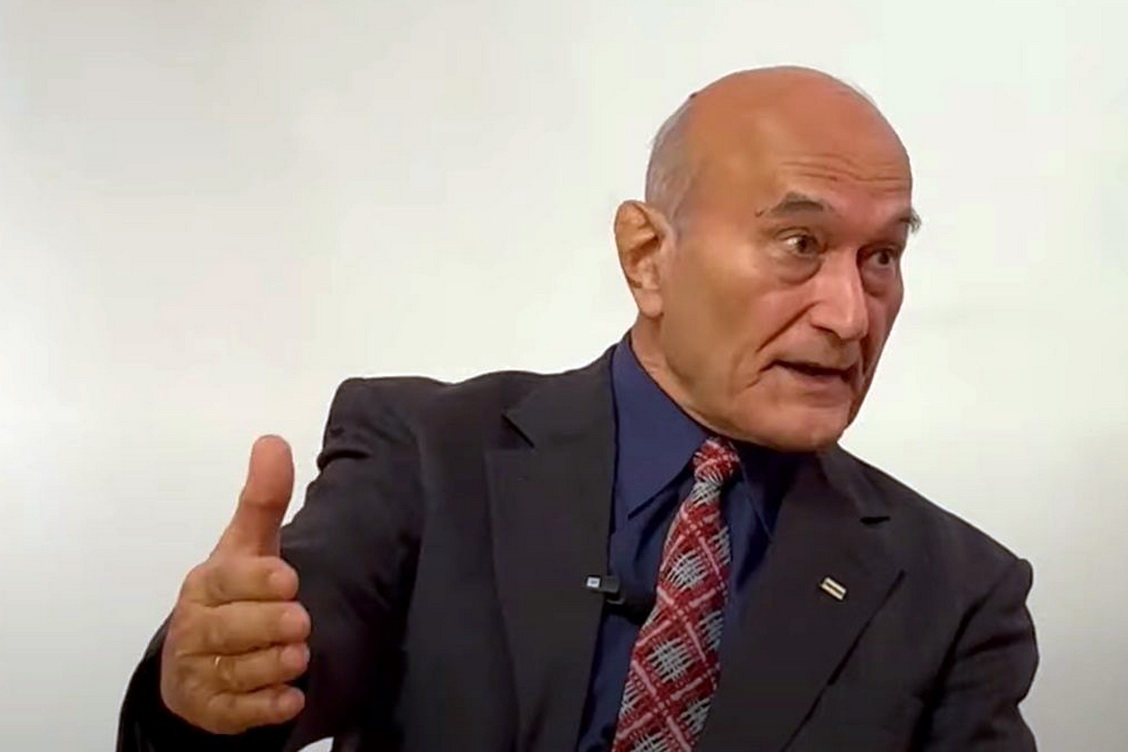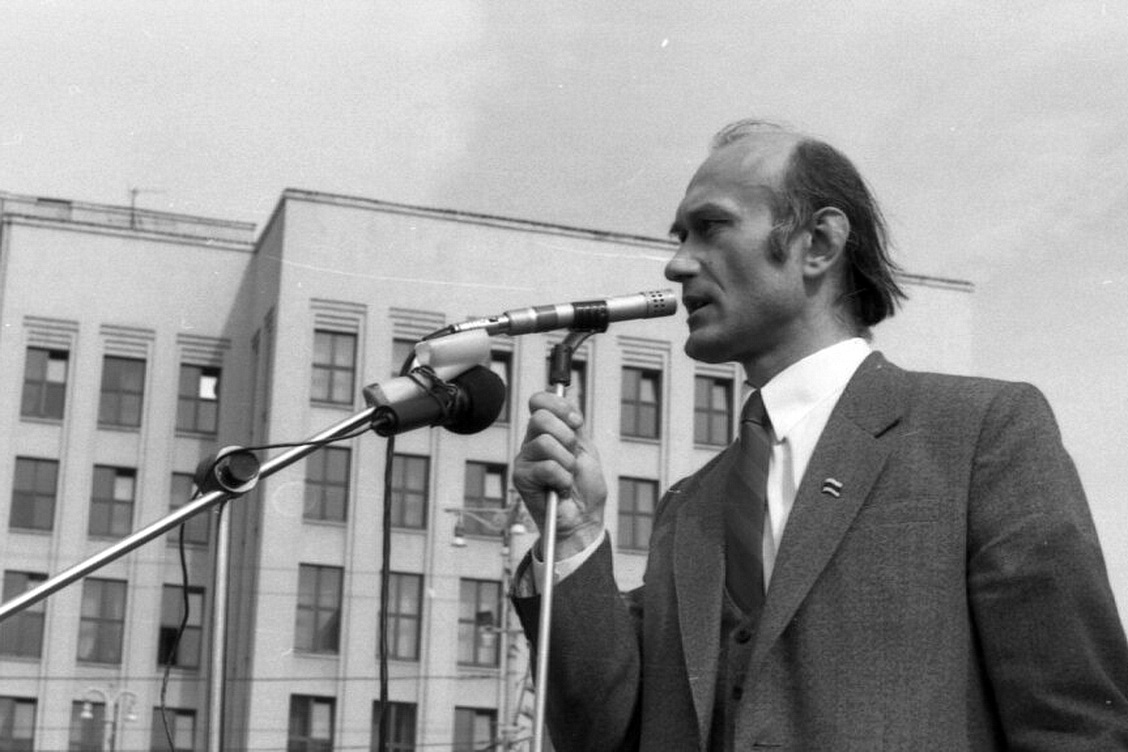Strident anti-Russian rhetoric prevented Zianon Pazniak, leader the Belarusian Popular Front (BPF), from winning the 1994 presidential race. His message that cast Russia in a negative light was a hard sell in society dominated by pro-Russian sentiment. Belarus’ new opposition leaders are pushing similar anti-imperialist narratives.

Pazniak stirred controversy with his article headlined “On Russian Imperialism and its Danger” ran by the parliamentary newspaper Narodnaya Gazeta 30 years ago on January 15, 1994.
BPF leader’s foresight
Pazniak wrote his article after the Liberal Democratic Party of Russia (LDPR), an ultra-nationalist right-wing party led by Vladimir Zhirinovsky, won almost 23 percent of seats on the State Duma in the December 1993 election. The West perceived its success as a serious threat to democracy in Russia.
The article came out two weeks before the Supreme Soviet dismissed nationalist politician Stanisłaŭ Šuškievič as its chairman, while the government of Viačesłaŭ Kiebič was looking to strengthen economic ties with Russia.
Kiebič, a typical Soviet bureaucrat, was known for his pro-Russian views, while Šuškievič relied on his personal connections with Russian President Boris Yeltsin.
Pazniak’s political view of Russia has always been negative. He did not believe in its democratization and made no distinction between “democrats” from Yeltsin’s camp and Zhirinovsky with his fiery nationalism.
Pazniak saw the LDPR leader’s rise as proof that Russian imperialism poses an existential threat to Belarus.
In his appearances, the BPF leader spoke against any alliances with Russia and warned that Moscow would interfere in the internal affairs of post-Soviet countries under the pretext of protecting its national interests and Russian speakers.
Pazniak insisted that Belarus should pull out of the Commonwealth of Independent States (CIS) and adopt a neutrality policy. He saw the country’s future in the Baltic-Black Sea alliance and in Europe.
He promised that if he came to power he would bring Soviet and pro-Russian officials to account, initiate the withdrawal of Russian troops and the “reunification of eastern Belarusian territories,” such as Russia’s Smolensk region, with Belarus.
He intended to demand compensation from Russia for the Chernobyl disaster and to claim Belarus’ share of Soviet gold reserves and foreign assets.
Over the past decades, the political landscape in Belarus has changed considerably, but the Russian threat remains.
Why did not Pazniak’s message resonate in 1994? And why did Belarusian pro-democracy forces adopt it only three decades later?
Most officials and ordinary people had pro-Russian views
Pazniak’s article frightened both officials and their Moscow patrons. The BPF’s rise to power was quite possible in the early 1990s. It could lead to a major shift in relations with the Kremlin and reduce Moscow’s influence on Minsk.
The introduction of the presidential system helped the government to blunt the BPF’s momentum, but Prime Minister Kiebič was extremely unpopular.
Meanwhile, MP Alaksandar Łukašenka, appointed as chairman of the parliamentary anti-corruption commission, seized the opportunity to oust Šuškievič and launch his presidential bid.
Moscow favored both Kiebič and Łukašenka over Pazniak, who was portrayed by Belarusian state media as a radical Russophobe who would discriminate against Russian speakers and force them to leave the country if he came to power.
Belarus was heavily Russified during the Soviet rule. In the early 1990s most Belarusians sympathized with Russia, remained under its cultural and political influence and regretted about the collapse of the USSR.
Pazniak’s alarmist view of Moscow was alien even to pro-democracy politicians who admired Yeltsin and expected him to democratize Belarus.
Pazniak was aware of the public sentiment. In his article he said that “our nation is deeply and seriously ill” and “recovery would be a slog as people are slow to understand what is going on.”
Pazniak’s accurate, insightful and prophetic analysis of Russian imperialism showed some voters the way to “recovery,” but he did not capitalize on it politically.
Pazniak had no chance of winning
In his article, Pazniak wrongly predicted that 1994 would be “the last year of the nomenklatura.” Instead, it was a year of its comeback.

The BPF leader gained just 13 percent of the vote in the 1994 presidential election, although he did quite well in Minsk and the Hrodna region.
Siarhiej Naŭmčyk, a former member of the BPF’s parliamentary faction, claims in his memoirs that the vote was rigged and that Pazniak actually came in second.
Either way, Pazniak obviously had no chance of defeating Łukašenka who was pushing for integration with Russia.
Anti-imperialist stance a tough challenge for pro-democracy forces
After 1994 and later, in political exile, Pazniak has not changed his attitude toward Russia and has perceived Łukašenka’s authoritarian regime primarily as a proxy of Russian imperialism.
In Belarus, Pazniak’s anti-Russian rhetoric resonated with nationalists, but met with criticism from the government and many opposition leaders.
In its struggle against Łukašenka, the Belarusian opposition repeatedly tried to secure the Kremlin’s support, but to no avail. At critical moments, both Yeltsin and Vladimir Putin always backed Łukašenka.
In 2020, pro-democracy presidential candidates Viktar Babaryka, Valer Capkała and Śviatłana Cichanoŭskaja avoided calling out Russia or emphasized their positive view of the neighbor.
The strategy seemed reasonable given Russia’s influence on Belarus and pro-Russian sentiment in the country.
Belarusians’ perception of Russia has not changed much under Łukašenka. Although most of them would like to live in an independent country and oppose a merger, they still have a favorable opinion of Russia. Even its full-scale invasion of Ukraine has not had a major impact on people’s attitudes.
The war, Western support for the democratic forces, and Minsk’s ever-increasing, now almost total dependence on Moscow have forced the exiled Belarusian opposition to finally declare Russia as the major threat.
Except for territorial claims, its message does not differ much from the point of view Pazniak expressed in 1994, and it is still a hard sell in Belarus.